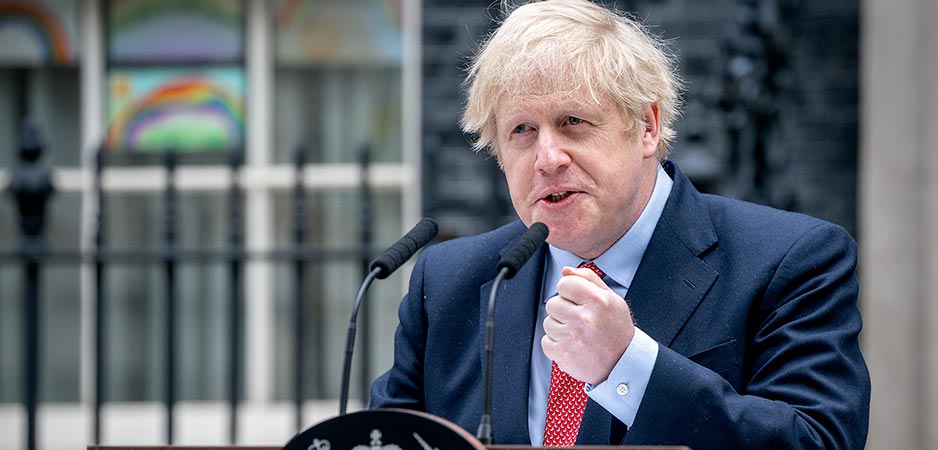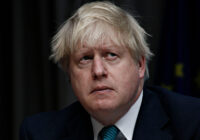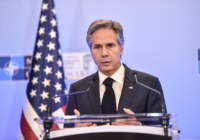“Can we please go back to talking about Brexit?” For the past few weeks, I got used to seeing this message on Twitter at least once a day, breaking the monopoly of news about the novel coronavirus. For some, it was a joke, half-nostalgically taking us back to the days when we couldn’t wait for Brexit to be over and the UK to leave the European Union, just so we could talk about something else. (If this isn’t a case of being “careful what you wish for” taken to a whole new level, then I don’t know what it is.)
COVID-19 Makes Johnson and Trump Reject Thatcher and Reagan
Yet some asked a serious question: What lies ahead for the post-Brexit trade talks between the UK and the European Union? The 11-month transition period, which ends on December 31, was considered too short by pretty much everyone except the UK government even before the world came to a standstill. During this period, the United Kingdom remains in the EU customs union and single market.
The fact that the EU’s Michel Barnier and the UK’s Boris Johnson came down with COVID-19 was just the cherry on the cake. There have been expert analyses and legitimate protests from UK industries, charities and Welsh and Scottish politicians, calling for talks to be put on hold and for the transition period to be extended. This would allow the UK government and the EU to focus on getting the situation with the coronavirus pandemic under control first. So why, in some sort of 2019 re-run, is Prime Minister Johnson insisting that the UK will end the transition period by December?
Getting Brexit Done at All Costs
The most incredible thing about Brexit is just how sacrosanct it has become. I cannot help but compare this to the dissolution of Czechoslovakia in 1993, much as it was based on a deep-rooted and long-standing wariness of one side toward the other. In both cases, the divorce was first and foremost a political move.
What is different about Brexit, however, is that an election promise adhered to a little too religiously has become the grand symbol of the will of the people — the litmus test by which British democracy is measured. If the election promise in 2010 to not raise university tuition fees had been adhered to with at least half the vigor, we would all be literally better off and the Liberal Democrats wouldn’t be wondering if they will ever regain their political influence ever again. But that’s another story.
The point is that the only thing that came to matter was that Brexit was done at all costs. Brexiteers were convinced it was right and just, and most “remainers” — despite the exasperated “it was all nonsense anyway” remarks on social media — resigned themselves to the reality of leaving the EU.
Johnson is the person who promised the British public that Brexit can and will be done and, what’s more, that it will be beneficial, easy and quick. He is the last in line of politicians around whom a Brexit-anchored cult of personality has developed and which has carried him through to Number 10. I still remember his “independence day” closing speech on a BBC-televised debate in June 2016 as the moment I knew the “vote leave” campaign was going to win the Brexit referendum. He has been there from “take back control” to “get Brexit done,” which won him a resounding electoral victory in December 2019.
By then, Johnson managed to convince most — including myself, despite my best intentions — that he was the only man for the job. Seemingly, nothing was going to stand in his way, domestically or internationally, in finishing the Brexit story and moving onto the process of “healing,” among other priorities. And then, just like that, a global pandemic requiring literal healing has pulled his perfectly placed rug out from under his feet.
For around half a decade, Brexit has been pretty much the only thing that mattered in the UK. Even now, there are enough Britons out there who see the postponement of trade talks as a ploy to keep the UK aligned with the EU for longer. For some, the European Union’s response to the coronavirus pandemic is further proof that the UK is better off out of the union. (The EU’s failure to communicate properly about what it is doing, why it matters and how it benefits its citizens is once again a subject in itself.)
Facts and Reason
Yet something has finally shifted. Facts and reason were forced back into fashion, leaving behind a sense of perspective — everything the Brexit debate has missed from the start. A global pandemic has turned people’s attention away from the Brexit boogeyman hiding under their bed to a real threat with potentially deadly consequences. Brexit is being exposed for what it is at this stage: a nation pulling out of a series of treaties, not an identity-making moment. This task has now been brushed aside by a monumental challenge for the world.
This is not to say the task is insignificant. Despite the rhetoric coming out of Number 10 in the run-up to January 31 that the Brexit story was over with the UK leaving the EU, both sides know the hardest part still lies ahead. The idea that Britain could leave the union with no trade agreement would have caused chaos a couple of years ago, never mind now with the inevitable global recession that’s coming.
Despite the health crisis taking center stage, the EU tabled a full proposal of a draft treaty on March 13. The UK, meanwhile, has only put down a handful of documents covering trade, transport, aviation and nuclear cooperation, all the while insisting on getting a final agreement by the end of the year. Regardless of when and how the talks continue, the days when Brexit commanded the sole attention of the UK and the EU are over.
Prime Minister Johnson knows this. The fact that he is not yet agreeing to prolong the transition period indicates two things.
First, just like the rest of us, he is adapting to the current situation, trying to hold on to the hope that life will, at some point, go back to normal — at least partially. As prime minister of a country that is outside of the EU with no agreed trade deal during a pandemic that is bound to be followed by a global economic crisis, even Johnson can be cut some slack for being slightly disoriented.
Second, Johnson has been aptly described as “a man who waits to see the way the crowd is running and then dashes in front and says: follow me.” He is biding his time to either strike fast should the coronavirus suddenly abate and still just about deliver on his promises, or to wait for a moment when the public mood is just right for him to announce that emotion must give way to reason.
Having watched Boris for the best part of a decade, I believe he can wear the suit of a crisis manager just as well as he wore the habit of a high priest of Brexit, if that is what the situation calls for.
*[GLOBSEC is a partner institution of Fair Observer.]
The views expressed in this article are the author’s own and do not necessarily reflect Fair Observer’s editorial policy.
Support Fair Observer
We rely on your support for our independence, diversity and quality.
For more than 10 years, Fair Observer has been free, fair and independent. No billionaire owns us, no advertisers control us. We are a reader-supported nonprofit. Unlike many other publications, we keep our content free for readers regardless of where they live or whether they can afford to pay. We have no paywalls and no ads.
In the post-truth era of fake news, echo chambers and filter bubbles, we publish a plurality of perspectives from around the world. Anyone can publish with us, but everyone goes through a rigorous editorial process. So, you get fact-checked, well-reasoned content instead of noise.
We publish 2,500+ voices from 90+ countries. We also conduct education and training programs
on subjects ranging from digital media and journalism to writing and critical thinking. This
doesn’t come cheap. Servers, editors, trainers and web developers cost
money.
Please consider supporting us on a regular basis as a recurring donor or a
sustaining member.
Will you support FO’s journalism?
We rely on your support for our independence, diversity and quality.






